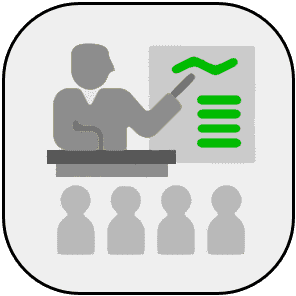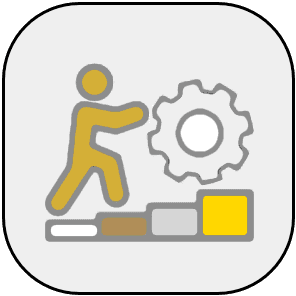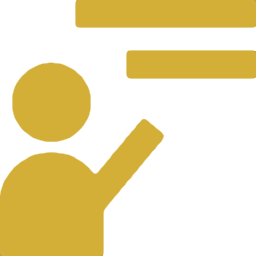What is Action Learning?
Some variations of definitions for Action Learning are:
- A process for bringing together a group of people with varied levels
of skills and experience to analyze an actual work problem and develop an
action plan. The ad-hoc group continues to meet as actions are implemented,
learning from the implementation and making mid-course corrections. Action
Learning is a form of learning by doing.
- An approach to individual and organizational development. Working in
sets or groups, people tackle important organizational issues or problems
and learn from their attempts to change things. Traditional instruction,
or "programmed knowledge", is appropriate when we are faced with "puzzles"
- challenges that have a right answer. However, when we are faced with "problems"
- challenges that have no right answer - we need critical reflection or
"questioning insight". Action learning encourages such reflection by providing
the support to enable people to learn from challenges as well as from themselves
and the process itself. The benefits of learning on all these levels are
that the knowledge is more likely to be transferable to other situations
and participants will be engaged in "double loop learning" where they not
only receive feedback on their actions, but will find their underlying assumptions
and mental models under scrutiny.
- An experience-based approach to developing people that uses work on
meaningful problems as a way to learn. Action learning programs involve
small groups that meet regularly to take action on critical, real problems
while explicitly seeking learning from having taken that action. Usually,
the learning aspect is facilitated by a learning coach who is skilled in
using the collective experience of group members to create learning opportunities.
Action Learning typically comprises the following activities

- Experiential learning.
- Creative complex problem solving. See also: Case Method
- Acquiring of relevant knowledge.
- Co-learning group support.
Each of these activities can be regarded as a necessary component, but
insufficient by itself, to be considered as Action Learning.
characteristics of Action Learning
- An emphasis on learning by doing.
- Conducted in teams.
- Addressing company / organizational issues.
- With participants placed into problem-solving roles.
- Where team decisions are required.
- Formalized into presentations.
Origin of Action Learning. History
Professor Reg Revans first introduced and coined the term "Action Learning"
in the coal mines of Wales and England in the 1940s. In Revans interpretation,
the purpose of Action Learning is not just to promote local action and learning,
but to bring about organizational change. As in "The enterprise as a learning
system" (1969).
the Action Learning Formula
Reg Revans described Action Learning with the formula L = P + Q, where
Learning (L) occurs through Programmed knowledge (P) and insightful Questioning
(Q)
Usage of the Action Learning. Applications
- To address problems and issues that are complex and can not easily be
resolved.
- To find solutions for underlying root causes of problems.
- To determine a new strategic direction or to maximize new opportunities.
- Generating creative ideas.
Steps in Action Learning. Process
- Clarify the objective of the Action Learning group. Presentation
of the problem or the task to the group. A group may handle one or many
problems.
- Group formation. The group can consist of volunteers or appointed
people, and can work on a single organizational problem or each other's
department's problems. Convene a cross-section of people with a complementary
mix of skills and expertise to participate in the Action Learning group.
Compare: Belbin Team Roles.
Action Learning groups may meet for one time or several times. Depending
on the complexity of the problem and the time available for its resolution.
- Analyze the issue(s) and identify actions for resolving them.
- The problem owner presents the problem briefly to the group.
He can remain involved as a member of the group, or withdraw, and await
the group's recommendations.
- Reframe the problem. After a series of questions, the group,
often with the guidance of the Action Learning consultant, will reach a
consensus on the most critical and important problem the group should work
on. The group should establish the crux of the problem, which might differ
from the original presenting problem.
- Determine goals. Once the key problem or issue has been identified,
the group seeks consensus for the goal. The achievement of the goal would
solve the restated problem for the long-term with positive rather than negative
consequences on the individual, team, or organization.
- Develop action strategies. Much of the time and energy of the
group will be spent on identifying, and pilot testing, of possible action
strategies. Like the preceding stages of Action Learning, strategies are
developed via reflective inquiry and dialogue.
- Take action. Between Action Learning sessions, the group as a
whole and individual members collect information, they identify the support
status, and they implement the strategies developed and agreed to by the
group.
- Repeat the cycle of action and learning until the problem is
resolved or new directions are determined.
- Capturing learning. Throughout and at any point during the sessions,
the Action Learning consultant may intervene. He can ask questions to the
group members, which will enable them to:
- Clarify the problem.
- Find ways to improve their performance as a group.
- Identify how their learning can be applied to develop themselves,
the team, and the organization.
After a period of time, reconvene the group to discuss progress, lessons
learned, and next steps. Document the learning process for future reference.
Record lessons learned after each phase of learning.
Strengths of Action Learning. Benefits
- Offers an intelligent and creative way to act and learn at the same
time. This has become essential in a work environment that is rapidly changing
and that faces evermore unpredictable challenges.
- Can help to solve complex, urgent problems.
- Instrumental to develop skilled leaders, or to develop teams.
- Can help to transform corporate culture, and to create learning organizations.
- Produces tangible outcomes as a return on investments in education.
- Adults are most motivated for learning when it is immediately relevant
to their lives. Participants can test the utility of frameworks and techniques
on tangible problems, and are able to see for themselves what can be usefully
applied, and what can not be usefully applied.
Limitations of Action Learning. Disadvantages
- Necessary to organize multiple Action Learning events, to make it effective.
- The design and content of the Action Learning program is crucial to
its success.
- The accomplishment of the example task or project can potentially overwhelm
the reflective learning process. Without reflection and feedback, Action
Learning is similar to a normal day on the job.
- In teams where a single individual or a single functional perspective
dominates, the group tends to produce outcomes that are not very innovative
or insightful. (Compare: Groupthink).
- Good and objective facilitators are needed.
- Risk of poor follow-up on project outcomes.
Book: R.W. Revans
- Action Learning: New Techniques for Management
Book: Michael Marquardt
- Action Learning in Action: Transforming Problems and People...
Book: Michael Marquardt
- Optimizing the Power of Action Learning: Solving Problems and Building Leaders...
|
Courses about Action Learning.

Beginners Course
|

Advanced Course
|

Course for Experts
|
|
|
|
The best, top-rated topics about Action Learning. Here you will find the most valuable ideas and practical suggestions.
|
🥇
|
Why Action Learning? Purpose
Many "study groups" result in heightened awareness and increased knowledge but often stop there. In my work with action learning teams (mostly corporate based) the key purpose is getting increased or ...
 41  1 comments
|
|
🥈
|
Similar Knowledge Level
First of all, to succeed in active learning, the different entities involved should not be far in terms of basic knowledge to be able to achieve an initial transfusion of knowledge from the highest to...
 27  1 comments
|

|
Action Learning Principles
1. Make sure that your students understand why
2. Respect that they have different styles to learn (auditory-visual-kinesthetic)
3. Allow them to experience what they are learning....
 24
|

|
Introduction to 2nd and Consecutive Sessions
I have learned that is very important to start second and consecutive sessions in a learning course with a brief review of the past concepts, to reinforce them in the process. Just select some questio...
 24
|

|
Virtual Action Learning
Is anyone doing virtual action learning? If so i'd be very interested to hear from you. I'm researching this emerging form of action learning....
 15  6 comments
|

|
Puzzles , Problems and New Learning
I wholeheartedly agree about the difference between 'puzzles' and 'problems'. However, for me, there is a problem of context. The AL sets I have been involved with all take place in the workplace, or ...
 11  4 comments
|
|
|
|
Advanced insights about Action Learning. Here you will find professional advices by experts.

Consultancy Tips
|

Teaching Tips
|

Practical Implementation Tips
|
|
|

|
Capturing Learned Lessons: After Action Reviews How to Capture Organizational Learning? Best Practices
Knowledge from bad and good experiences will lead you and your organization to better future performance. You can improv...
|

|
'Action' Learning is Misleading... Understanding Action Learning
Note that the title "Action Learning" can be a bit misleading, because it emphasizes action, learning in practical situa...
|

|
Action Learning Groups / Programs Creating an Action Learning Organiztion
According to Michael J. Marquardt (Action Learning in Action), there are two basic types of programs: Single-project pro...
|

|
6 Action Learning Components How To Apply It
According to Michael J. Marquardt (Action Learning in Action), Action Learning has Six Interactive Components:
1. A pro...
|

|
Execution as Learning Similar Approach
Also compare Action Learning with the quite similar Execution as Learning-approach by Amy Edmondson....
|

|
Core Characteristic of Action Learning What Makes an AL Group Different?
The difference between a simple work team (like a task force or a quality circle) and an Action Learning group is the si...
|

|
Alignment is key Change and innovation
Having used action learning in several programs over 3 years I now always align the Action Learning with the strategy of...
|
|
|
|
Various sources of information regarding Action Learning. Here you will find powerpoints, videos, news, etc. to use in your own lectures and workshops.

|
Action Learning in Action Action Learning, Problem Solving
Good, detailed presentation about Action Learning by M.J. Marquardt.
- Concept of action learning, benefits and an some...
|

|
Action Learning Schools and Varieties, History of Action Learning Action Learning
This presentation outlines the various schools on action learning and the varieties of Action Learning it has generated....
|

|
A Leader's Guide to After-Action Reviews After-Action Reviews
In-depth manual on conducting After-Action Reviews by US military....
|

|
Action Learning Guide Anyone Interested in Learning About Action Learning
Open source Ashridge College reference document with background and description of Action Learning, as well as useful bo...
|

|
Introduction to Action Learning by Reg Revans Historical Background and Foundation of of Action Learning
In this 1984 (!) video, Professor Reg Evans explains that the central idea behind and the foundation of Action Learning ...
|

|
Applying Creative Thinking to Complex Business Problem Solving Creative Thinking, Problem Solving, Complex Problem Solving Techniques
This presentation focuses on creative thinking as a useful tool for dealing with complex business issues. It includes th...
|

|
Introduction to Working in Teams, Team Work and Related Concepts Team Management, Team Work, Groupthink
Presentation about teamwork, including the following sections:
1. Importance of Teams
1.1. Introduction
1.2. Definiti...
|

|
Organizational Framework Action Learning
Paper by Ivo de Loo and Otmar Donnenberg. Action learning programs are supposed to result in both personal and organizat...
|

|
Professor Evans Explains Why Fast Change Requires New Ways of Learning and Thinking Action Learning, Coping with Change, The Need of Change, The Need for New Ways of Learning
In this historic video Action Learning Professor Reg Evans shows that it is very important to understand that today's ra...
|

|
The Knowing - Doing Gap A New Action Learning Perspective?
'The Knowing-Doing Gap' by J. Pfeffer & R. Sutton explores and identifies the causes of this gap and provides insights o...
|

|
Action Learning Toolkit Action Learning Sets
This is a very good sample activity which you are welcome to use in your training programmes. This sample activity is ju...
|

|
Tools and Approaches to Complement Action Learning (3) Action Learning Tools
This Action Learning Question asks how I will use my learning insights and understanding from Research Papers 1 and 2 to...
|

|
Action Learning Diagram Experiential Learning
Download and edit this 12manage PowerPoint graphic for limited personal, educational and business use.
Republishing in ...
|

|
Action Learning in Leadership Programmes (2) Action Learning for Leadership Development
How I will use my learning insights from Paper 1 to organise the Action Learning content/process before commencement, in...
|

|
Co Consulting Action Learning Different AL Approach
Co Consulting Action Learning
Involves working with a group or set of people in a quiet space. The novelty in this appr...
|

|
Evaluation of Action Learning Approaches to a Leadership Programme (1) Action Learning
“How do I evaluate, and learn from, the use of Action Learning approaches within a pilot Leadership Programme to inform ...
|

|
Radka Action Learning Matrix Team Leadership Reflection and Assessment
A new matrix which explores the dynamics of action and learning within teams and in relation to the behaviour of the tea...
|
|
|
|
Useful tools regarding Action Learning.

News
|

Videos
|

Presentations
|
| |

Books
|

Academic
|

More
|
|
|
|
Compare with Revans' Action Learning: Case Method | Team Management
Profile |
Stages of Team Development
| 8D Problem Solving
| Appreciative
Inquiry |
Positive Deviance |
Analogical Strategic
Reasoning |
Knowledge Management
(Collison & Parcell) |
SECI model |
Bridging Epistemologies
| Organizational Learning
| Organizational
Memory |
Cause and Effect Diagram
| Root Cause Analysis
| Metaplan |
Groupthink |
Six Thinking Hats
| Emotional Intelligence
| Training Within Industry
| Pyramid Principle
Return to Management Hub: Change & Organization | Communication & Skills | Decision-making & Valuation | Knowledge & Intangibles | Strategy & Innovation
More Management Methods, Models and Theory
|
|
|














